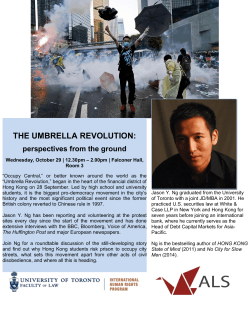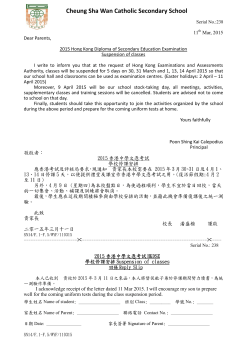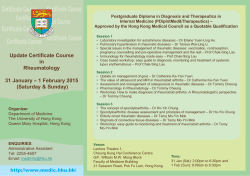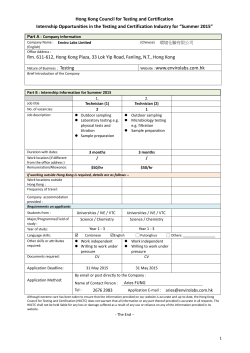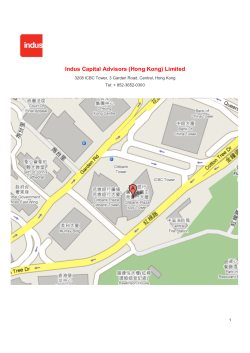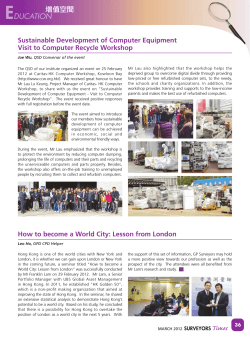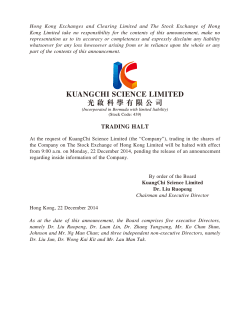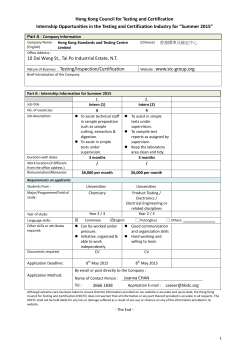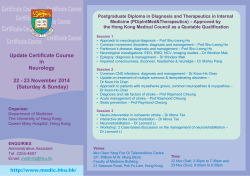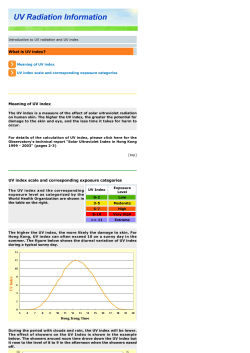
Doing Research Integrity across the Arts and
Doing Research Integrity across the Arts and Humanities A One-Day Workshop, with Professor Monica Heller The University of Hong Kong, Centennial Campus, Run Run Shaw Tower, 7/F, Room 7.45 Wednesday 22 April 2015, 9:15am – 5:30pm PROGRAMME 9.15–9.30 Welcome 9.30–11.00 Keynote lecture: Research integrity in theory and practice: Doing critical sociolinguistic ethnography Monica Heller, University of Toronto 11.00–11.30 Coffee 11.30–12.30 Discussion of keynote 12.30–14.00 Lunch 14.00–15.30 Presentations by RPGs: Doing ethnographic work in Chinese criminal courts: A researcher’s dilemma Jade Biyu Du, School of English Bystanders in institutional ethnography Kara Fleming, School of Humanities, Linguistics Research integrity in a socio-legal study on unrepresented litigants Matthew Yeung, School of English Understanding transgender people in Hong Kong Kimberly Tao, School of English When indigenous communities ask linguists to have their languages documented Dalan M. Peranginangin, School of Humanities, Linguistics 15.30–16.00 Coffee 16.00–17.00 Discussion of case studies 17.00–17.30 General discussion, summing up and close Registration Please register for the workshop at http://arts.hku.hk/DoingResearchWorkshop by 13 April 2015. Registration includes lunch and coffee breaks. There is no registration fee. Electronic versions of the readings and abstracts will be sent to all registered participants before the event. Organised by Professor Adam Jaworski, Associate Dean (Research), Faculty of Arts Dr Lisa Lim, Chair, Departmental Research Postgraduate Committee, School of English Supported by Research Integrity Funding Scheme, The University of Hong Kong 1 ABSTRACTS Keynote Lecture: Research integrity in theory and practice: Doing critical sociolinguistic ethnography Monica Heller Department of Social Justice Education, Ontario Institute for Studies in Education, University of Toronto What does it mean in ‘responsible research’ to use the lens of language to enquire into the making of social difference and social inequality? In this workshop, we will make links among the kinds of theory of language and society within which such a question even makes sense, the kinds of research goals that question generates, what it produces as relevant data, and the social relations involved in identifying them, analysing them and telling the story they teach us. We will draw from examples of my own (sole and team) fieldwork on language and nationalism in francophone Canada, and work through implications of some of the questions workshop participants bring to the conversation. Suggested * and further reading *Heller, M. 2008. Doing ethnography. In Li Wei and M. Moyer, eds. Research Methods in Bilingualism and Multilingualism. Oxford: Blackwell. 249–262. Cameron, D., E. Fraser, P. Harvey, B. Rampton and K. Richardson. 2014 [1992]. Ethics, advocacy and empowerment. In A. Jaworski and N. Coupland, eds. The Discourse Reader, 3rd ed. London: Routledge. 128–141. (Or the same chapter in 1st or 2nd edition of The Discourse Reader). Heller, M. 2011. Paths to Post-nationalism: A Critical Ethnography of Language and Identity. Oxford: Oxford University Press. 1–12. Biography Monica Heller, Professor at the Ontario Institute for Studies in Education, University of Toronto, and current President of the American Anthropological Association, is one of the most regarded, contemporary anthropological linguists and sociolinguists. For several decades, she has conducted solo ethnographic research and led large research teams across a wide range of social and institutional contexts – manufacturing and service industries, government organizations, education, media, etc. While her work has largely focused on social, political and cultural change under globalization in Canada, the implications and theoretical impact of her work have resonated internationally. Case studies: Doing ethnographic work in Chinese criminal courts: A researcher’s dilemma Jade Biyu Du School of English, HKU My research project focuses on interpreter-mediated criminal hearings in Chinese courtrooms. In 2014, I conducted four months’ fieldwork in two local courts in south China. In this presentation, I will highlight some ethical issues that I have encountered in the process of collecting primary data, including approaching informants and using off-record information. Because of ideological concerns in the current Chinese context, requiring research participants to sign an informed consent form may jeopardize their anonymity. How one obtains research participants’ informed consent without causing them any danger has to be taken into consideration when doing fieldwork in China. On some occasions, I happened to engage in small talk with some people working in the legal sphere. How can the off-record information obtained from such informal encounters be used without violating research ethics? Finally, I will address the issue of maintaining participants’ anonymity in public presentations. Overall, by reflecting upon my personal experience, I aim to discuss the dilemmas I have been confronted with in fieldwork, that is: how to achieve the optimum for research and maintain research integrity at the same time. 2 Bystanders in institutional ethnography Kara Fleming School of Humanities – Linguistics, HKU When conducting ethnography or observation in an institution, it can be impossible to get informed consent from everyone the researcher comes into contact with. How should researchers behave with regard to these interactions? I will discuss this issue with reference to my own research in a secondary school. Though I had informed consent from all the central student and teacher participants, during my fieldwork I also took part in school events and informal interactions with others. I will discuss my attempts to balance respect for non-participation and privacy with a desire to incorporate additional perspectives and present my research site accurately, and consider potential implications for researchers working in similar contexts. When indigenous communities ask linguists to have their languages documented Dalan M. Peranginangin School of Humanities – Linguistics, HKU This paper responds to a question on how linguists should satisfy demands from indigenous communities who want their languages to be documented. The discussion begins from my experiences in working in LIPI’s (the Indonesian Institute of Sciences) project on documenting Pagu, a minority language spoken in North Halmahera of North Maluku province, eastern Indonesia. The project ended in 2014 but the Pagu community still needed such a work. They raised money for project, and successfully got funding from a gold mining company, (Nusa Halmahera Mineral – NHM), enough for running a new project for the next four years (2015 – 2018). Three other neighbouring communities in NHM’s ‘inner circle’ also want their languages and cultures to be documented as they also worry that their cultures and languages will die. What should we do as linguists in order to fulfil such demands? Understanding transgender people in Hong Kong Kimberly Tao School of English, HKU My project concerns the way law classifies and defines fundamental terms such as “man” and “woman”. But it also seeks to include the voices of transgender people themselves and to present their own views about the nature of gender identity. I interviewed 12 Hong Kong transgender people, a protracted process through which I intended to find out how they perceived gendered labelling and the categories that have been imposed on them and how they performed their gender roles. Since I am interacting with people that are members of a small and barely visible minority, it is important for me to always remind myself that I have to be extra cautious about and sensitive to their feelings and privacy. In my presentation, I will be sharing my experiences in interacting with transgender people in Hong Kong and issues that I encountered when I was trying to maintain a friendly yet professional relationship with them. Research integrity in a socio-legal study on unrepresented litigants Matthew Yeung School of English, HKU This presentation deals with the notion of research integrity in the context of law - the interactions between unrepresented litigants (laypeople who represent themselves without legal counsel) and legal professionals. Unfamiliarity with legal knowledge and settings renders most unrepresented litigants unable to navigate the legal system well on their own, and, in fact, many judges and lawyers often see unrepresented litigants as the root of communication problems in court (see Cameron, Kelly & Chiu, 2006; 2007; Kelly & Cameron, 2002; 2003; Kelly, 2005; Ng, 2009). My research intends to give voice to unrepresented litigants using a bottom-up approach. Data were collected by conducting courtroom observation, questionnaires and interviews with unrepresented litigants in Hong Kong. The presentation will explain how the research approaches the informants and handles the data with the aim of addressing their voice in the issue of self-representation. The presentation will conclude by suggesting how a minimal intervention in the interview process with laypeople may be useful for socio-legal research. 3
© Copyright 2025
